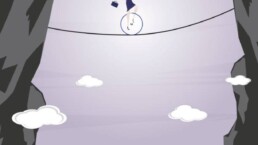Profession: Job Title
Imagine you are invited to a dinner party with lots of people you have never met before. As you enter the room, the host introduces you to a group of strangers. It is a moment when most of us hold our breaths: what will he say? How will he introduce me? Usually we are introduced with our job title and the name of the company we work for. But what does that really say about us?
Our social status is largely connected to our profession. If Angela Merkel loses the position of the most powerful woman in Germany, what will remain? We can ask the same question when the CEO of a major bank resigns. Again, what remains from the prestige of the position? One thing is certain: the number of invitations that people receive will drastically fall as soon as they leave their role and suddenly become “less important” in the eyes of society.
Defining who you are based on values, talents and passion is certainly not an easy task, yet it is the most sustainable of all ways: no one can ever take such a “title”, which purely expresses who you are, away from you. Letting go of the superficial shell of a job title requires courage and confidence: by leaving, it may seem that we cut off a part of our identity. Yet in reality, true identity cannot be determined by social status. Its source is inside us.
There are two ways of gaining recognition: either by following a predetermined path, shared by others; or by introducing and applying a new discipline. For example: a marathon runner who aims for a new course record will be appreciated only as long as he or she holds the record, but those who introduce a completely new discipline might set a lasting impression.
A Character is Born
The word character originates from the ancient Greek expression kharakter (= engraving), which means “engraved mark”. The initial meaning gave rise to the definition “distinguishing qualities”. When it comes to people, the ones with character are fascinating even in their imperfections. Their beliefs and distinct features - what I refer to as “edges” - shape their lives in an authentic way. The key to achieving this state of mind is a conscious self-awareness that helps manifest one’s characteristics.
Developing character is not something that can be faked. Authenticity requires continuous and hard work: it takes a lot of time to develop the “edges”. Pablo Picasso started his painting career with realistic portraits at the age of 15. Over the years, however, he developed his own style, gradually opening a new dimension of art (Cubism) in his early 30s. On our character journey, self-realization becomes the prime objective, regardless of expectations (like deriving one’s identity from a job title). The yes’es and no’s of an authentic life stem from clarity; which fuels the filtering of opportunities, decisions, people, concepts, and ideas. Therefore, clarity gives focus. Furthermore, a character does not show arrogance - it would be a contradiction, a person simply is who he or she is.
Beyond Competition
Have you ever asked yourself why so many friends (or even yourself) want to run a marathon at least once? If we are very honest, of course, a sprinkle of competitiveness always accompanies our decision to sign up for a race. It would only be fair if we asked ourselves: “Why do I need to show that I am ‘better’ than others?” The answer is probably linked to our need to belong and to find a role in a certain context, expressed through a status in the top ranks.
People with true character do not care about the racetracks of societal expectations, they create their own context instead - even if it is considered irrelevant or ridiculous by society. Today most people who are regarded as “successful” have no character, but are merely smart enough to play well within the system. However, since titles no longer bring satisfaction, my conviction is that we are entering an era in which developing character will be as “normal” as studying to be a lawyer or financier is today. The quest for meaning in a world where everything is instantly accessible is increasingly gaining importance. I see a craving for meaning beyond knowledge and for true differentiation based on quality. A job title is not enough anymore.
Substantive change never originates from the masses: overconsumption, instant access to goods and services globally, and the banality of infinite freedom creates a sense of emptiness in the soul, as one realizes that what appeared to be part of one’s identity was just a piece of rented-out and meaningless decoration. As the shell starts to crumble, we realize that the true context lies within ourselves. The era of artists arises.
How to Become a Character?
It does not matter whether we want to learn a new language, become more athletic, or run a successful business: strict focus and consequently developing a routine is essential for success. As an experienced yoga teacher once told me: awareness, development, proficiency and mastery - this is the due course of every discipline.
Zero Senses helps you become aware of your values, develop a conscious understanding of your vision and wants, and embrace all this in confident decision making. As we consistently practice this course, mastery will follow.
Like a catalyst, we condense your essence. What remains is your characteristics expressed in words and a clear picture. A conscious awareness of your character guarantees more clarity expressed through independent decisions, as well as for being seen for who you are.
image source: https://www.wikiart.org/en/pablo-picasso
Share

